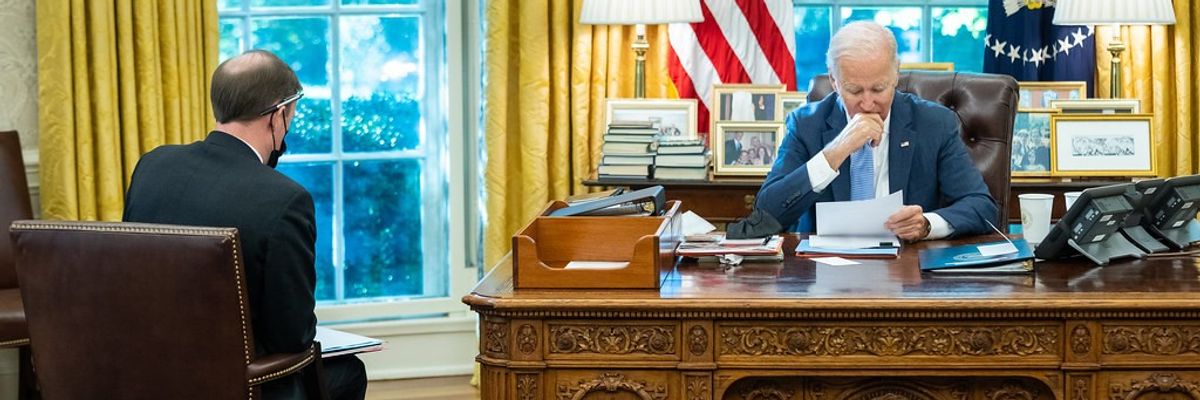Calls for President Joe Biden to take direct military action against Iran are ratcheting up following this weekend’s drone attack in Jordan that killed three U.S. service members and wounded over 30 others.
Biden has said that “it was carried out by radical Iran-backed militant groups operating in Syria and Iraq” and vowed “to hold all those responsible to account at a time and in a manner our choosing.” Tehran has denied involvement in the attacks.
This is the latest major escalation in the Middle East since Hamas’s incursion into Israel on October 7, and Tel Aviv’s retaliatory war on Gaza. The Biden administration has maintained that it does not want a war with Tehran and that it continues to seek paths to de-escalation in the region — but following the first known deaths of U.S. personnel since the war in Gaza started, members of Congress are pushing for a swift response.
“The United States can and must respond to this brazen attack,” said Sen. Mark Warner (D-Va.), in a post on X.
“This attack on U.S. and coalition troops in Jordan — our steadfast regional partner — is an escalation, and cannot go unanswered. I support President Biden in a deliberate and proportionate response,” added Sen. Ben Cardin (D-Md.), the chairman of the Senate Foreign Relations Committee.
Some Republican hawks, many of whom are long-time advocates of regime change who have been calling for an aggressive response against Tehran since October 7, went a step further, calling for a direct confrontation with Iran.
“The only thing the Iranian regime understands is force. Until they pay a price with their infrastructure and their personnel, the attacks on U.S. troops will continue,” Lindsey Graham (R-S.C.), wrote in a long thread on X. “Hit Iran now. Hit them hard.”
“The only answer to these attacks must be devastating military retaliation against Iran’s terrorist forces, both in Iran and across the Middle East,” added Sen. Tom Cotton (R-Ark.) “Anything less will confirm Joe Biden as a coward unworthy of being commander in chief.”
Sen. Roger Wicker (R-Miss.), the ranking member on the Senate Armed Services committee, said that Washington must strike “directly against Iranian targets and its leadership.”
But not all members, including Republicans, want to lurch headlong into war. And not all of them think the president has the unilateral authority to do so. The administration was already conducting strikes against Houthi targets in Yemen without seeking congressional approval, drawing harsh criticism from a bipartisan host of senators and House members.
Some of those lawmakers renewed their calls over the weekend, insisting it is Congress’s responsibility to declare war.
“There is no ‘Iran is bad’ exception to the Constitution,” Sen. Mike Lee (R-Utah) wrote on X. “If we’re going to war, Congress must declare it.”
Rep. Thomas Massie (R-Ky.), agreed, writing on X that “[b]ombing Iran would require an Act of Congress according to the Constitution.”
“Is there anyone you don’t want to bomb?,” he later added, in response to Lindsey Graham’s X thread.
Observers of the GOP say that this is evidence of a growing divide within the party on questions of foreign policy. “War with Iran is a red line. Any who advocate for it have the mark of a failed, American old guard,” Curt Mills, executive director of the American Conservative, tells RS. “On the Republican side, the choice is stark and obvious: a total rerun of the failures of the Bush years— pitted against a new party that is actually reckoning with that disaster and offering a foreign policy tailored to the interests of Americans.”
On the other side of the aisle, several Congressional Democrats are warning against further escalation.
“To the chicken hawks calling for war with Iran, you're playing into the enemy's hands—and I’d like to see you send your sons and daughters to fight," Rep. Seth Moulton (D-Mass.), an Iraq War veteran, told Reuters. "We must have an effective, strategic response on our terms and our timeline."
"We can’t allow the deaths of U.S. service members to go unanswered – but we also can’t give in to the war hawks who look for any reason to go to war with Iran. Direct confrontation with Iran will certainly lead to the deaths of more U.S. service members and could easily expand into a regional conflict," added Rep. Sara Jacobs (D-Calif.). "I urge President Biden to proceed thoughtfully and carefully with a strategic, proportional response that avoids unnecessary escalation. We also must continue to pursue a permanent ceasefire between Israel and Hamas – not only to bring all the hostages home safely and get humanitarian aid into Gaza, but also to end the war that’s emboldening Iran.”
How exactly Biden will respond remains unclear. Axios reported on Monday that top U.S. officials were discussing "significant military response," though Axios and a number of other major media outlets say that the administration is still keen to limit the potential of a wider war.
High level talks are reportedly continuing over a potential ceasefire proposal in exchange for the release of Israeli hostages. “We’re hopeful about progress, but … we should not expect any imminent developments,” said the national security council spokesperson, John Kirby, said at the White House press briefing on Friday. The Axios report from Monday noted that some Biden administration officials acknowledge that a ceasefire is a crucial piece of reducing regional tensions.
Rep. Pramila Jayapal (D-Wash.) continues to insist that a cessation of hostilities in Gaza is the only way to prevent that regional conflagration from happening, writing on X that her “calls for ceasefire have always been about saving lives - in Gaza, Israel, and the region, and preventing a larger conflict. My heart goes out to the US service members who have lost their lives, and their loved ones. This must end.”














